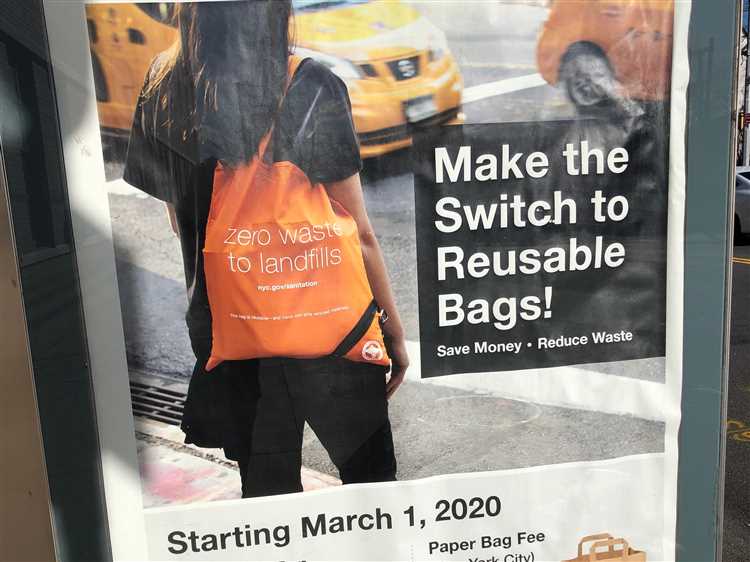
In an effort to reduce the environmental impact of plastic bag usage, New York City has implemented a plastic bag policy that includes charges for single-use plastic bags. This policy, which went into effect on March 1, 2020, aims to encourage residents and visitors to switch to reusable bags and reduce their reliance on plastic bags.
Under the new policy, customers who choose to use plastic bags at participating retailers will be charged a fee of 5 cents per bag. This fee is intended to incentivize consumers to bring their own reusable bags or opt for other alternatives, such as paper bags. The fee applies to all retail businesses that are required to collect sales tax, including grocery stores, pharmacies, and clothing retailers.
It is important to note that there are exemptions to the plastic bag fee. Certain types of bags, such as those used to package uncooked meat, fish, or poultry, are exempt from the charge. Additionally, customers who participate in the Supplemental Nutrition Assistance Program (SNAP) or the Special Supplemental Nutrition Program for Women, Infants, and Children (WIC) are exempt from the fee.
- Why Was the NYC Plastic Bag Policy Introduced?
- Environmental Concerns
- Reducing Waste and Changing Consumer Behavior
- How Does the NYC Plastic Bag Policy Work?
- What are the Charges for Plastic Bags?
- What are the Environmental Benefits of the NYC Plastic Bag Policy?
- What are the Reactions and Impact of the NYC Plastic Bag Policy?
- Conclusion
- Q&A,
- What is the NYC plastic bag policy?
- Are plastic bags banned in NYC?
- How much is the charge for plastic bags in NYC?
- Can I bring my own bags to avoid the charges?
Why Was the NYC Plastic Bag Policy Introduced?
The NYC plastic bag policy was introduced as part of a broader effort by the city to reduce plastic waste and encourage environmental sustainability. Plastic bags have been a significant source of pollution, particularly in urban areas like New York City. They are often discarded after one use and can end up in landfills or littering the streets, parks, and waterways.
In an effort to address the environmental impact of plastic bags, the city implemented the plastic bag policy, which includes a charge for single-use plastic bags at most retail establishments. The policy aims to incentivize consumers to bring their own reusable bags when shopping, reducing their reliance on single-use plastics.
Environmental Concerns
Plastic bags are notorious for their negative impact on the environment. They are made from non-renewable resources, such as fossil fuels, and are not easily biodegradable. This means that once plastic bags are discarded, they can persist in the environment for hundreds of years.
Plastic bags also pose a significant threat to wildlife. Animals can mistake bags for food, leading to ingestion and potential suffocation. Additionally, plastic bags can clog drainage systems, causing flooding and other water management issues.
Reducing Waste and Changing Consumer Behavior
By introducing the plastic bag policy, the city aims to reduce the amount of plastic waste generated and promote more sustainable practices among consumers. The policy encourages individuals to make conscious decisions about their use of plastic bags and to seek out reusable alternatives.
Not only will the plastic bag policy help decrease the number of single-use plastic bags in circulation, but it will also raise awareness about the larger issue of plastic waste and its detrimental effects on the environment. It is part of a broader campaign to educate and engage individuals in waste reduction and environmental conservation efforts.
How Does the NYC Plastic Bag Policy Work?
The NYC plastic bag policy aims to reduce the use of single-use plastic bags and promote the use of reusable bags. Under this policy, customers are charged a fee for each plastic bag they use at certain stores in New York City.
Starting on March 1, 2020, the fee for each plastic bag is 5 cents. This fee is applied to all plastic carryout bags provided by the store, regardless of their size or thickness. The fee does not apply to certain types of bags, such as those used for produce, prescription medication, or meat, as well as bags provided by local food pantries for emergency food deliveries.
The money collected from the plastic bag fee is kept by the store, and it is not a tax imposed by the city. The stores have the option to donate the funds collected to a charitable organization if they choose to do so.
Businesses are required to clearly itemize the charge for each plastic bag on the receipt, separate from the cost of other items purchased. This ensures transparency and allows customers to clearly see how the fee is being applied.
The goal of the plastic bag policy is to encourage customers to bring their own reusable bags when shopping. By reducing the number of plastic bags used, the policy aims to minimize plastic waste and its negative impact on the environment. Additionally, it provides an opportunity to educate the public on the benefits of using reusable bags and the importance of reducing single-use plastics.
| Policy Details | |
|---|---|
| Effective Date | March 1, 2020 |
| Bag Fee | 5 cents per bag |
| Bag Types Excluded from Fee | Produce bags, prescription medication bags, meat bags, emergency food delivery bags |
| Disposal of Funds | Stores keep the money collected, with the option to donate to charity |
What are the Charges for Plastic Bags?
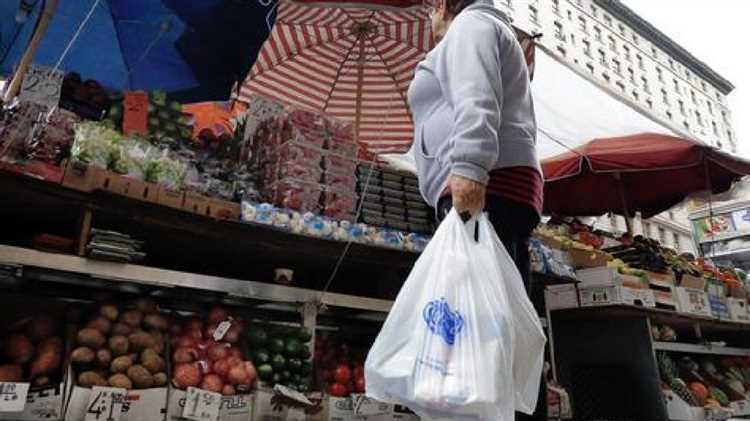
As of March 1, 2020, there are charges for plastic bags in New York City. The goal of this initiative is to reduce single-use plastic bag waste and promote the use of reusable bags.
The charges for plastic bags in NYC are as follows:
- For most stores, there is a charge of $0.05 per bag.
- For paper bags, there is also a charge of $0.05 per bag.
- For bags provided by certain exempt stores, such as restaurants, there is no charge.
The charges are collected by the store and not by the city or state. The money collected from the bag charges goes to the store and can be used to cover the costs of providing bags or to support other environmental initiatives.
It’s important to note that certain individuals are exempt from paying for bags, including those who participate in the Supplemental Nutrition Assistance Program (SNAP) or the Special Supplemental Nutrition Program for Women, Infants, and Children (WIC).
To avoid the charges for plastic bags, it is encouraged to bring your own reusable bags when shopping. Reusable bags are an eco-friendly alternative and help reduce plastic waste.
What are the Environmental Benefits of the NYC Plastic Bag Policy?
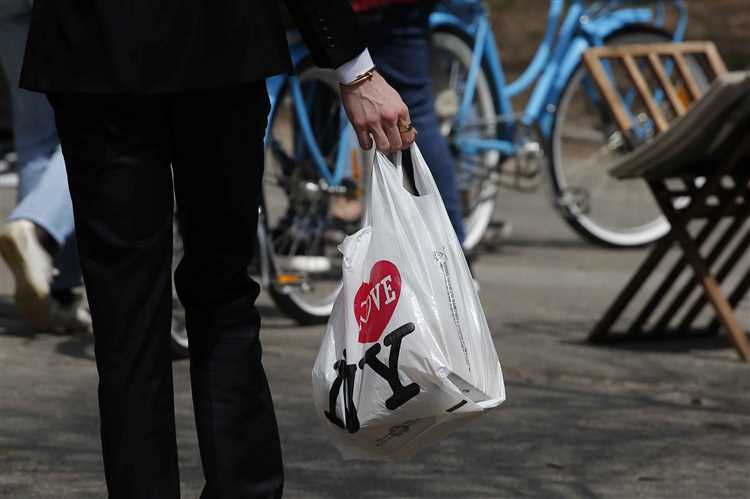
The NYC plastic bag policy has several significant environmental benefits. By reducing the use of plastic bags, the policy aims to address some of the environmental concerns associated with their production, use, and disposal.
- Reduction in plastic pollution: Plastic bags are a major source of environmental pollution. They often end up in landfills, waterways, and oceans, posing a threat to wildlife and marine ecosystems. By discouraging their use, the NYC plastic bag policy helps to mitigate this pollution and protect the environment.
- Conservation of resources: The production of plastic bags requires significant amounts of fossil fuels and energy, contributing to greenhouse gas emissions and climate change. By reducing the demand for plastic bags, the policy helps to conserve these resources and reduce the overall carbon footprint.
- Promotion of sustainable alternatives: The NYC plastic bag policy encourages the use of reusable bags as an alternative to single-use plastic bags. Reusable bags are more durable and can be used repeatedly, significantly reducing the amount of waste generated. This promotes a more sustainable approach to shopping and encourages consumers to make environmentally friendly choices.
- Improvement of waste management: Plastic bags often cause problems in waste management systems as they can get tangled in sorting machinery or end up as litter. By reducing the use of plastic bags, the policy helps to improve the efficiency of waste management processes and reduce operational challenges.
- Positive impact on wildlife: Wildlife, especially marine animals, can mistake plastic bags for food or become entangled in them, leading to injury or death. By reducing plastic bag usage, the NYC plastic bag policy helps protect wildlife and preserve biodiversity in the city and surrounding areas.
In conclusion, the NYC plastic bag policy has a range of environmental benefits, including the reduction of plastic pollution, conservation of resources, promotion of sustainable alternatives, improvement of waste management, and positive impact on wildlife. By implementing this policy, New York City is taking a significant step towards a more environmentally sustainable future.
What are the Reactions and Impact of the NYC Plastic Bag Policy?
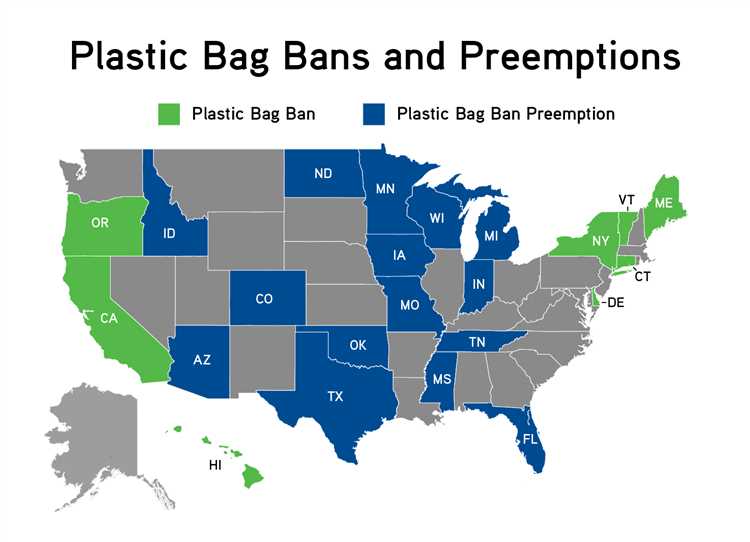
When the NYC plastic bag policy was implemented, it received mixed reactions from the public. Some residents and environmental activists applauded the move, seeing it as a step towards reducing plastic waste and protecting the environment. They believed that the policy would encourage people to bring their own reusable bags and promote a more sustainable lifestyle.
However, the policy also faced criticism from others who were skeptical about its effectiveness. Some argued that charging for plastic bags would disproportionately affect low-income communities who rely on them for their daily needs. They felt that the policy would create an additional financial burden for those who can least afford it.
As for the impact of the policy, it has undoubtedly reduced the number of plastic bags distributed throughout the city. Many retailers reported a significant decline in plastic bag usage, with some customers opting for reusable alternatives such as canvas bags or paper bags.
The NYC plastic bag policy has also spurred a change in consumer behavior. People have become more conscious of their plastic consumption and are actively seeking ways to reduce it. This has led to an increase in the use of reusable bags not just in grocery stores but also in other retail establishments.
Furthermore, the policy has prompted businesses to find alternative solutions to plastic bags. Many retailers have started offering biodegradable or compostable bags as a more sustainable option. Others have implemented incentives to encourage customers to bring their own bags, such as discounts or loyalty points.
Conclusion
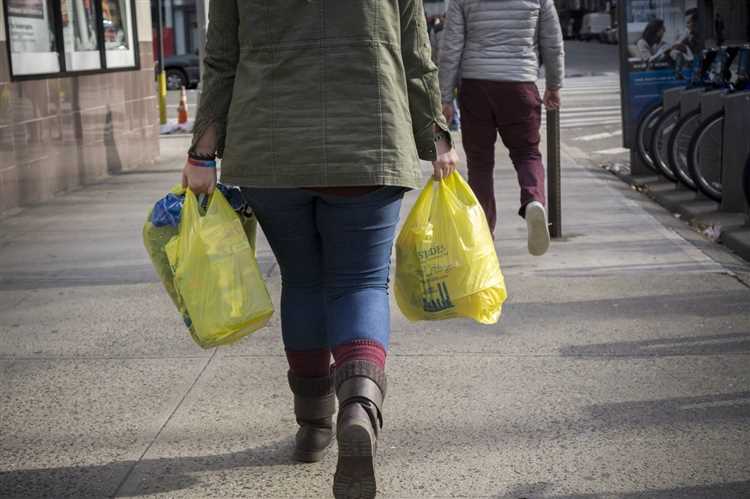
The NYC plastic bag policy has generated both positive and negative reactions from the public. While some see it as a necessary step towards reducing plastic waste, others criticize its potential impact on low-income communities. Nevertheless, the policy has resulted in a noticeable decrease in plastic bag usage and has encouraged a shift towards more sustainable practices. It will be important to evaluate the long-term effects of the policy and address any unintended consequences that may arise.
Q&A,
What is the NYC plastic bag policy?
The NYC plastic bag policy is a local law that went into effect on March 1, 2020, which places restrictions on the distribution of plastic bags by retailers in the city.
Are plastic bags banned in NYC?
No, plastic bags are not completely banned in NYC. However, there is a charge for plastic bags in most retail stores in the city.
How much is the charge for plastic bags in NYC?
The charge for plastic bags in NYC is 5 cents per bag. This charge applies to most retail stores, excluding certain types of businesses like restaurants and pharmacies.
Can I bring my own bags to avoid the charges?
Yes, you can bring your own bags to avoid the charges for plastic bags. Using reusable bags can help reduce waste and protect the environment.